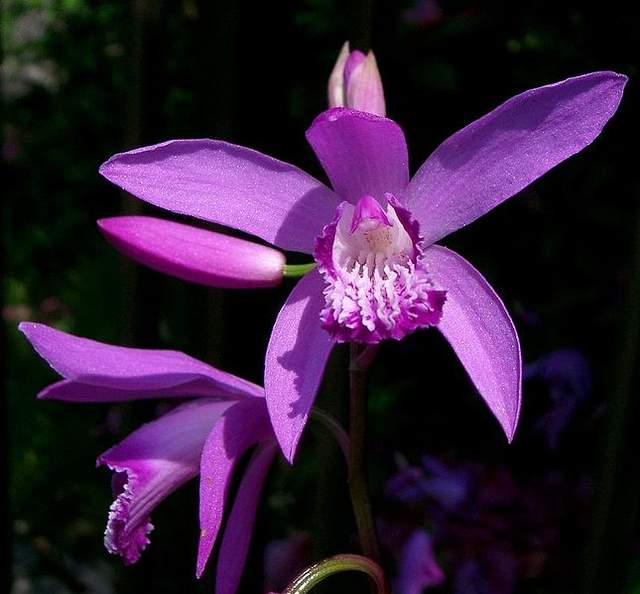Though we all admire orchids for their beauty, but there is more to them then that. For centuries they have been used by locals/tribals as a source of medicine. Many ancient societies have literature that cites use of orchids for treating various ailments. Some of these are mentioned below.
Taking water decoction of the whole plant of Anoectochilus formosanus has been observed to prevents tumor activity (inhibit tumor growth in mice, especially in colon tumors). Tubers of Bletilla striata are peeled and sun-dried then either cut into slices or are powdered. These tubers should be collected using a non-metal tool during August till November. The powdered tubers can be used externally for treating various skin problems such as swellings, acne sores, boils and cracked skin of hands and feet. other use: take 6 grams of powdered tubers thrice daily to stop bleeding in the stomach and/or intestines. The initial bitter taste turns sweet after chewing for some time. Though, long term use of this is not recommended as it can get toxic.
The tubers of many Eulophia species that grow in India have a high mineral content and tribal people are known to use these regularly. Especially, Eulophia campestris tubers that are dried in sun and powdered, and then boiled with 40 parts of water or cooked with milk (1 tsp powder to 1 teacupful of milk) to treat phthisis, diabetes, chronic diarrhea and dysentery.
Dried and powdered plants of Aerides crispum are boiled in neem oil, then filtered. 2-3 drops of this oil put into ear once at night can cure earache. Taking a teaspoonful of powdered roots of Orchis latifolia cooked in a cup of milk, can cure diarrhea and dysentery as well as weakness. A paste of leaves of Vanda roxburghii when applied on whole body can bring down fever. The juice of pounded leaves can be used to cure otitis media. Leaves of Vanda tessellate can also be used similarly. The juice of the stem of Dendrobium ovatum obtained by hand-crushing can be taken to cure constipation and stomach ache.
Note: The medicinal usages mentioned above cannot be used in replacement of prescribed drugs. Please consult a qualified practitioner before starting the above mentioned herbal medicine.
References
1. Bulpitt C. J, et.al. 2007. The use of orchids in Chinese medicine. Journal of the Royal Society of Medicine, Dec; 100(12): 558–563.
2. Gutierrez R.M.P, 2010. Orchids: A review of uses in traditional medicine, its phytochemistry and pharmacology. Journal of the Medicinal Plants Research. Vol. 4(8): 592 – 638.
 Bletilla striata.
Photography credit: KENPEI
Bletilla striata.
Photography credit: KENPEI
Using Orchids as Medicine
Curiosityby Anu Dharmani
Originally published in BellaOnline
Posted by Sys Admin over 7 years ago.Article Blog Article Index
Share on Social Media:
New Topics
- Kjell Meershoek started topic Re-inventing an orchidarium.. your thoughts in category Curiosity
- David George asked question Odom's Fascination - an unusual orchid in category General Discussion
- Carol Holdren asked question Grow Tent in the Garage in category General Discussion
- David George asked question rlc Caotan Beauty found at Home Depot in category Cattleya Alliance
- Kristin Dorris asked question Odontocidium Orchid fungus? in category General Discussion
New Comments
- Carol Holdren commented on topic "Re-inventing an orchidarium.. your thoughts" by Kjell Meershoek
- Inga Kruppa commented on member plant Acacallis cyanea Х Paradisanthus micranthus by Inga Kruppa
- Carol Holdren commented on topic "rlc Caotan Beauty found at Home Depot " by David George
- Carol Holdren commented on topic "Odom's Fascination - an unusual orchid" by David George
- Dr. Florian Wolf commented on topic "Wild. Lisa Devos" by Maria Fernandez
- Michael Valcarcel commented on member plant Rlc. Chief Takanaka by Walceli Muniz Valverde
- Michael Valcarcel commented on member plant Rlc. Montana Spirit by Michael Valcarcel
- Michael Valcarcel commented on member plant Ctt. Blazing Sun by Michael Valcarcel
- Michael Valcarcel commented on member plant Bc. Spotted Clown by Michael Valcarcel
- Maria Skrypnyk commented on member plant Yamadara Redland Sunset by Maria Skrypnyk
- André Pessina commented on topic "Odontocidium Orchid fungus?" by Kristin Dorris
- Linda Hartman commented on topic "Image of a plant please" by Leshya Perkins
- Paul Reavis commented on orchid Milt. Kismet
- Christiaan Viljoen commented on member plant Psh. fragrans by Christiaan Viljoen
- Christiaan Viljoen commented on member plant Z. maculatum by Christiaan Viljoen
- Christiaan Viljoen commented on member plant C. Gaskell-Pumila 'Azure Star' by Christiaan Viljoen
- Robert H. Findlay commented on member plant Rlc. Joy Sokabe var. Volcano Queen by Sally K
- James Lunsford commented on member plant Lc. Sagarik Wax 'African Beauty AMO/AOS x Blc. Cherry Suisse'Kauai' HCC/AOS var. Cattlyea 'Hybrid ' by James Lunsford
- John Varigos commented on orchid Bulb. schwarzii
- Linda Hartman commented on topic "Issue with Blc. Ben O'Neil "Jubilee" by Glenda Ratliff